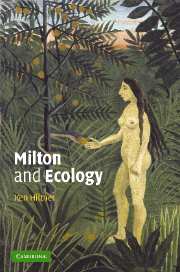Book contents
- Frontmatter
- Contents
- Acknowledgments
- Preface
- Introduction
- PART I HAVING PLACE
- 1 Place defined: the ecological importance of place
- 2 Place given: Eve as the garden's spirit of place
- 3 Place lost: Eve's Fall as an uprooting
- 4 Place regained: Sabrina puts down roots
- PART II THE UNDERLYING IMPORTANCE OF PLACE
- Notes
- Select bibliography
- Index
3 - Place lost: Eve's Fall as an uprooting
Published online by Cambridge University Press: 15 December 2009
- Frontmatter
- Contents
- Acknowledgments
- Preface
- Introduction
- PART I HAVING PLACE
- 1 Place defined: the ecological importance of place
- 2 Place given: Eve as the garden's spirit of place
- 3 Place lost: Eve's Fall as an uprooting
- 4 Place regained: Sabrina puts down roots
- PART II THE UNDERLYING IMPORTANCE OF PLACE
- Notes
- Select bibliography
- Index
Summary
To be in place is good and to be out of place is evil.
Wendell Berry, “Poetry and Place”The image of human beings kept low on Earth while Heaven stands above the Garden is a persistent one in Paradise Lost. When Satan first hears of the command regarding the Tree of Knowledge, he simply assumes that God intends “To keep them [human beings] low whom knowledge might exalt / Equal with Gods” (4.527–28). In many respects his temptation of Eve is an effort to convince her of this conviction: “Why then was this forbid? … / Why but to keep ye low and ignorant” (9.704–05). Not surprisingly, then, the idea that Eve can rise above her place on the Earth is first offered by Satan in the dream he induces as he tempts her to “Taste this, and be henceforth among the Gods / Thy self a Goddess, not to Earth confind” (5.77–79). But as genius loci, Eve is thoroughly connected to her place on the Earth, though not in the pejorative sense of Satan's “confind,” but in that she is nurtured and nurturer of what she and Adam recognize in their nightly prayer as their “delicious place” (4.729).
Nonetheless, to pull free of her place on the Earth is just what Satan makes Eve dream she can achieve:
Forthwith up to the Clouds
With him I flew, and underneath beheld
The Earth outstretcht immense, a prospect wide
And various: wondering at my flight and change
To this high exaltation.
(5.86–90)- Type
- Chapter
- Information
- Milton and Ecology , pp. 43 - 54Publisher: Cambridge University PressPrint publication year: 2003



